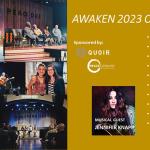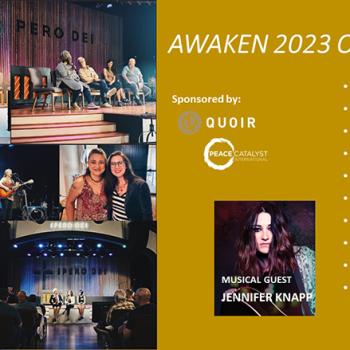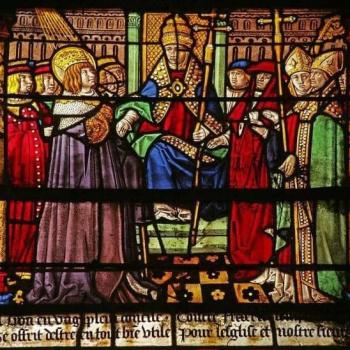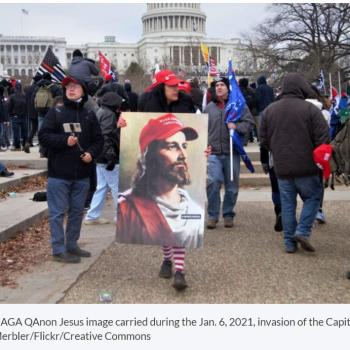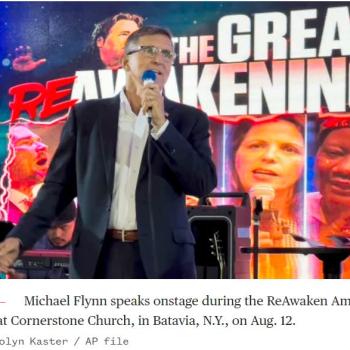
Spiritual Close Encounters
The benefit of social media is that we can find and friend people that we knew many years ago. Occasionally, I find a former student or colleague that I worked with in my days in the Christian School movement.
I’m not always certain how some of these reunions will go because I have moved beyond my evangelical past and don’t want to send these former acquaintances into shock. Mostly, people are good with where they find me because they have also moved on from evangelicalism. That gives us much to talk about, laugh at, and appreciate from each other’s walk and journey. Those are great conversations.
But occasionally I run into someone that has the same exact evangelical religious belief that they had 30 or 40 years ago (yes, I’m that old). Their speech hasn’t changed, the language hasn’t changed, and the ideas are the same as before. It is as if these people are frozen in time and have never sought to find meaning beyond their dogma or creed.
And of course, these individuals are “saddened” by my “backsliding” and rejection of evangelical religion. They pray for my soul….ok, I don’t mind people praying for me, but not that I’ll return to a religion and belief system that I had adopted but left decades ago.
The justification that these former friends and acquaintances use to bolster their unchanging position is rooted in a belief in the literal interpretation of the bible. They all seem to use the same verses to quote to me. Stuff like, “God is the same yesterday, today and tomorrow.” Or the grand trump card is “I (Jesus) am the way, the truth, and the life, no man comes to the father but by me.” The implication being I am a backslidden heretic that is probably going to hell.
I try to be polite and explain that I have evolved and changed in how I view faith. I don’t want to criticize or demean what they believe because for me faith isn’t about what a person believes. I feel no compulsion to try and get others to adopt my current beliefs. But it is hard for someone that believes that they have God’s absolute truth to think that someone else has a truth that is different.
But the conversations usually end with them wishing me well, and they offer a commitment to continue to pray for me. I never hear from most of them again. Perhaps that is just as well. I don’t need for others to treat me like a pariah or an object of evangelism.
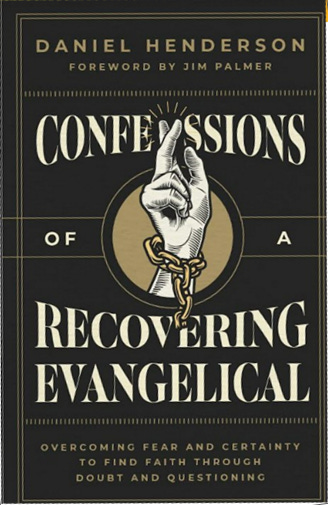
Four Stages of Spiritual Development
But these encounters remind me of something that I included in my book, Confessions of a Recovering Evangelical. One of the more important and profound ideas I learned came from the famous psychologist, M. Scott Peck. He wrote a groundbreaking book in 1987 called The Different Drum: Community Making and Peace. I read his book in the 1990’s, and the part that changed me was his description of the “four stages of spiritual development” which he equated to psychological human development. Indeed, the two are connected.
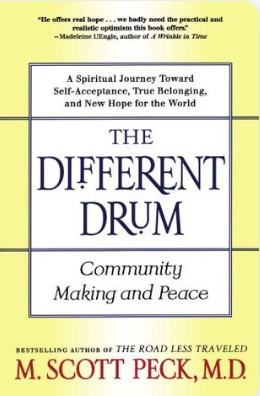
Peck’s overall purpose is stated here:
‘The overall purpose of human communication is – or should be – reconciliation. It should ultimately serve to lower or remove the walls of misunderstanding which unduly separate us human beings, one from another…’
Another word for reconciliation is the word connection or reconnection. For Peck and for me this is a spiritual process and journey. In this journey, Peck identifies four stages of spiritual growth and development, but he recognizes that people many times stay “stuck” in an earlier part of the journey.
Here are the four stages. When I read this, I was affirmed in my desire to continue to push, grow and evolve in my own life and faith. Other authors I read had reached the same conclusion. Faith is a journey, and to change is to be human. Growth means change. Learning is change…these are evidence of spiritual evolution.
Phase One – Chaotic, Disordered and Reckless
In this phase of spirituality, a person is a pretender. They may put on outward clothes of religious life through church attendance or even devotion, but their orientation is totally self-centered, and there is no commitment to any principle beyond the self. It resembles the sociopathic behavior of criminality but emerges in a religious context.
This phase is very similar to the infancy and toddlerhood phase of physical and psychological development. The world revolves around the child’s needs and wants. They throw tantrums and cry if they don’t get their way, and they seldom take personal responsibility for wrongdoings….which sounds eerily like….
The behavior of Donald Trump!
He is a classic example of a person stuck in this phase. He is the ultimate narcissist and self-absorbed human being that has no interest or compassion beyond his own ego and needs. Chaos defines his personal world, and unfortunately because he is a public figure, his chaos spills over into the political and social world that he touches. Individuals stuck in this stage in adulthood are a danger to themselves and the people around them. Most people grow out of this phase by age 5 or 6.
Phase Two – Formal and Institutional
This phase usually begins with a religious conversion and results in an enthusiastic commitment to religious orthodoxy and dogma. My conversion happened when I was around ten years old. It provides certainty and order out of the chaos and recklessness of phase one, but the individual finds solace in the sense of order and being right. All other views are dismissed based on Biblical texts. Questioning and doubt are not allowed or tolerated within communities of phase two religious people. Many people never allow themselves to outgrow this phase but remain stuck in the comfort of the certainty and order that they have found.
This is the phase of spirituality that I wouldn’t even call spiritual. It is religious indoctrination that doesn’t require any spiritual commitment at all. Most of the people that I mentioned that I run into from past years that are still stuck in the evangelical mindset are happy and content to be stuck there. They have no motivation to move on beyond it. Reasons are many, but I suspect they enjoy the certainty of constantly being right, in their own minds, about everything in the universe. They enjoy the surety of knowing who is going to heaven and who isn’t. And I suspect they secretly enjoy passing judgment on everyone else’s life and behavior. After all they have “the truth” right here in the bible. Any disagreement with them is a disagreement with the sacred text, or at least their cherry-picked interpretation of it.
I was never very comfortable with this phase in my own life although I did embrace it at one time. I tried to be a good dogmatist and purveyor of “the truth” but it always nagged at me that I could be wrong. I had read too much of historic classic humanist texts and studied other religions to be completely convinced that there was only one truth.
But reading Peck’s book gave me permission and motivation to leave phase two behind. That took me to the next phase:
Phase Three – Skepticism and Questioning
The earmark of this phase is a healthy questioning of all that one has learned to that point in life. Adolescents do this into adulthood until they develop their own sense of self. This phase includes the acceptance of doubt, reasoning, skepticism of religious authority including ancient texts, and critical evaluation of one’s religious assumptions. This becomes the realm of scientific approaches and even atheistic conclusions for some. For others, this is a transitory phase into a new world of faith and understanding.
Many who are leaving evangelical Christianity today call this phase “deconstruction.” People in the thousands are deconstructing their prior beliefs and seeking new directions and new answers. Perhaps they are seeking new questions. But this phase is a normal and natural part of a maturation process, spiritually. It can be scary and lonely because family and friends around you may condemn you for the doubt and questions. But if a person prevails through that persecution, there is a much bigger and expansive spiritual reality beyond.
Some people use this phase as a transition into atheism, and for some of them, they can revert to a phase two mentality of certainty and fundamentalist dogma, only now, preaching about the non-existence of God. I’ve found some atheists to be just as dogmatic and unbending in their belief system as any Christian fundamentalist.
For myself, I loved this phase because I was free to question and doubt. But instead of evolving toward atheism, this phase of the journey led me to a different understanding of faith. The good news is, there isn’t a pre-determined destination during this phase. It may lead to many different paths.
For me, faith was no longer a belief system or set of doctrines. It was very easy to pull those blocks apart and watch the whole structure crumble down. But doubt and questioning were a pathway toward faith, not away from it.
No, for me, faith was completely redefined. And it relates to the fourth phase that Peck identifies.
Phase Four – Mystical/Communal
This is the realm of moving well beyond the black and white binary understanding of faith, religion and the world itself. It is the acceptance and embrace of mystery and lack of having definite, dogmatic pat answers for all questions of life whether they be evangelical ones or atheistic ones. The difference between “truth” and “fact” becomes apparent to people in this phase and it is home of the connected mind and heart.
Faith and spirituality for me is having a “connected mind and heart.” Connection to myself to start. Jesus said the “kingdom of heaven is in you.” It isn’t out there somewhere in the sweet by and by; it is in you if you can connect to it.
Many who have gone through these phases might describe this phase as a “reconstruction” of their worldview and faith. But the difference is, this new conception of faith or the world isn’t definitive or a new dogma or creed. It is based on humanity and the connections we make to ourselves, the people around us and the world. It can’t be contained in a statement of faith because it includes ALL statements of faith and goes well beyond.
Making Community
Traditional Evangelical Christian stage two thought only serves to unite those people that share the same mindset. It separates itself from the rest of humanity that Evangelicals deem “unregenerate.” It creates an enclave of like-minded people that only seeks connection to others of the same theology. It is incapable of creating community and connections beyond itself. It is a religious system wholly inadequate to help overcome the divisions and problems of an interconnected and international world that is already connected via technology.
Once you enter this phase four of reconstruction or begin to, it will open a series of connections to the world around us, and especially to other people. All the walls and barriers I have constructed between me, and other people crumble under the power of human connections.
I think that is close to what Jesus may have been getting at when he said, “I and the Father are one.” Connections to other people and the environment itself is a spiritual oneness that blends us together in a mystical and spiritual way. It doesn’t require acceptance of a creed or doctrine. In fact, those just get in the way.
But this is more than just an individual experience. Peck’s book goes on to lay out how this fourth phase of spiritual growth can lead to repairing and healing communities. He describes how communities work, how group action can be developed on the principles of tolerance and love, and how we can start to transform world society into a true community by seeking these connections with people. It is a hopeful and optimistic view of humanity.
The reconstruction of our individual faith or worldview can promote the healing of those around us. That seems to me to be the point. Whether it is religious trauma, racism, homophobia, or general hatred, those that have discovered and nurtured human connections and have seen the communal impact of these connections, hold out great hope for our societies and civilization. It is a place that organized religion will never be able to take us.



